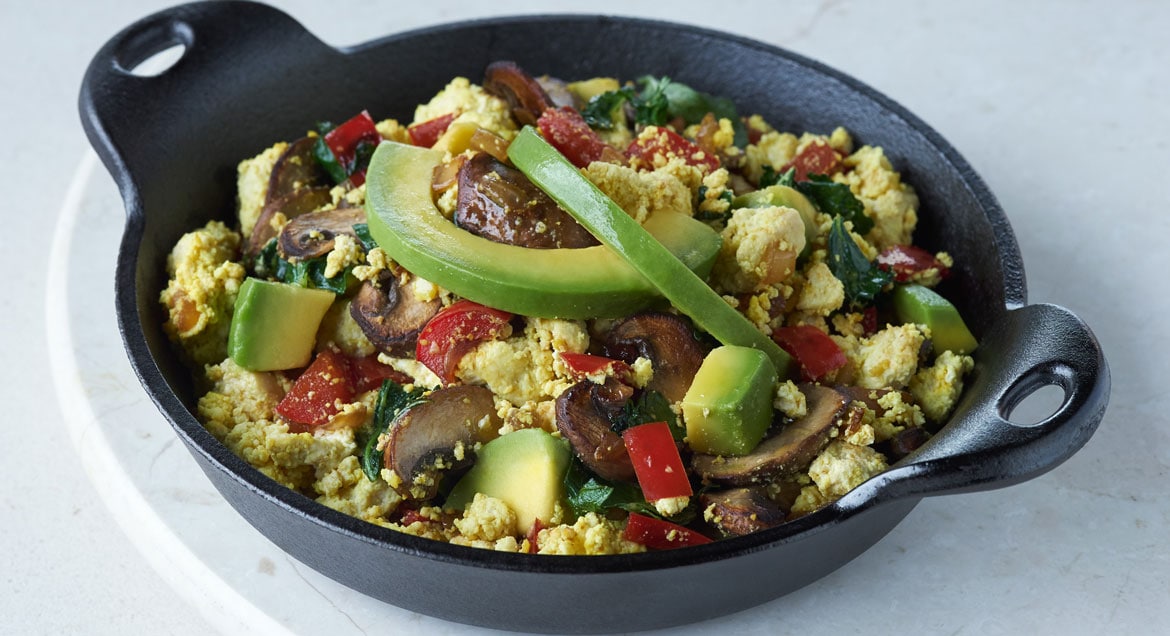
As with all fruits and vegetables, wash avocados before cutting. Check out our tips for how to choose and use California Avocados
With the abundance of health boasting benefits that may be found in eating a plant-forward diet, ranging from potentially lowering body mass index, cholesterol, blood pressure, and blood sugar (HbA1C), it’s no wonder the vegan and vegetarian styles of eating are increasingly popular. As a registered dietitian, I see people who are “doing” vegan/vegetarian right and those who are not. To get the most out of either way of eating and to ensure you are getting the nutri-ents you need to be your healthiest self, there are some basics of both diets to understand.
First things first, what do vegan and vegetarian diets actually mean?
A vegan diet by its traditional definition excludes all animal products, including meats, seafood, dairy products, eggs, and even honey. Some vegans will eat only raw foods (never eating items that are cooked above 118 degrees F) in addition to avoiding the items listed above.
A vegetarian diet is a little more complex as there are many types of vegetarian styles of eating. For instance, a lacto-vegetarian eats a predominately plant-based diet, excluding eggs, meats, seafood, and poultry while still incorporating dairy foods into their diet. An ovo-vegetarian, on the other hand, excludes meat, seafood, poultry, and dairy, but will enjoy eggs. And finally, a lacto-ovo-vegetarian does not eat meat, seafood, or poultry but will include eggs and dairy.
Thus, you can see, there are quite a few ways to eat as a vegan or vegetarian!
Regardless of your eating preference, be it vegan, vegetarian, a combination of the two, or may-be you allow yourself an occasional piece of meat (similar to a Mediterranean style of eating), as a registered dietitian nutritionist I don’t believe you need a label. But I do believe you need to fully understand the healthiest way to go about your eating habits to ensure you are nourishing your body right.
Enter, Fresh California Avocados, in season from spring through summer, the food that fits both vegan and vegetarian eating styles!
Yes, I am a spokesperson for the California Avocado Commission, but spokesperson or not, I have ALWAYS recommended California Avocados to my vegan and vegetarian clients because they are nutrient-dense, meaning they provide substantial amounts of vitamins, minerals, and other nutrients with relatively few calories.
A serving of avocado is one-third of a medium avocado (50 g) which has 80 calories and contri-butes nearly 20 vitamins, minerals and phytonutrients, including 11% of the recommended Daily Value (DV) for fiber, 10% vitamin K, 10% folate, 6% potassium, 6% vitamin E, 6% vitamin B, 4% vitamin C, 2% iron, and 14% DV pantothenic acid (vitamin B5).
Plus, the Dietary Guidelines for Americans and the American Heart Association® recommends eating a variety of nutritious foods from all food groups.
Too often, I see clients who choose to go down a vegan or vegetarian dietary path without the proper knowledge and end up trying to satisfy their hunger without satisfying their bodies need for balance and nutrient-dense foods. Dietary fiber adds bulk to the diet and can help you feel fuller faster, which can increase satiety (the state of feeling full/satisfied). A qualified health pro-fessional can show you how to incorporate a variety of fruits and vegetables, like California Avocados, into the eating plan of your choice, while still enjoying those whole grains and healthy plant proteins, too!
Given that most vegetarian and vegan styles of eating generally omit animal proteins, it’s impor-tant that we address some nutrients of concern to discuss with your registered dietitian nutritio-nist or physician. For example, vitamin B-12, vitamin D, omega-3 fatty acids (EPA and DHA), calcium, iron, and zinc are common nutrients of concern for vegetarians and vegans. Though plant-based food sources and many fortified foods are now available with these nutrients, it’s still challenging for most people to adequately balance their daily intakes to get enough of these foods. Thus, a trained healthcare professional can help you focus on getting your nutrient needs through whole food sources, like Fresh California Avocados! If you’re concerned you don’t know how to do this alone, don’t fret! Contact a registered dietitian versed in vegetarian and vegan di-ets to help you plan the best diet to meet your individual needs.
Now to get you started, or to expand your recipe repertoire if you are already following a vegan or vegetarian lifestyle, here are two of my favorite California Avocado recipes with this delicious heart-healthy fruit that provide naturally good fats, plant-based protein, complex carbohydrates, and whole grains! Both recipes are vegan, so if you follow a vegetarian eating plan that allows for dairy products or eggs, you can customize either recipe by adding your favorite cheese or an egg cooked any style.
Delicious Vegan and Vegetarian Recipes
California Avocado Loaded Sweet Potatoes Recipe
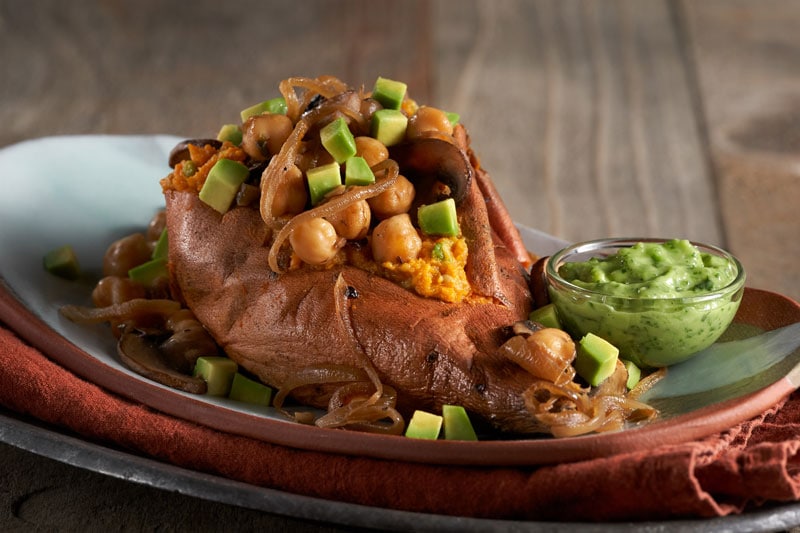
A fun vegan twist on a loaded potato dish, lightened up and loaded with flavor and nutrition! Using sweet potato as the base, Fresh California Avocado is gently folded into the sweet potato to cre-ate a buttery-like taste. On top is a flavor-packed mixture of onions, mushrooms, more avocado, and fiber-filled garbanzo beans, dressed up with a delicious California Avocado Cilantro Coulis! Whether you are vegan, vegetarian, or have a food allergy, most everyone can enjoy this dish, worry free, and rest easy knowing they’re delivering 110% DV of vitamin A, 54% DV of fiber and 30% DV of potassium to nourish their body!
Tofu-Avocado Vegetable Breakfast Scramble Recipe
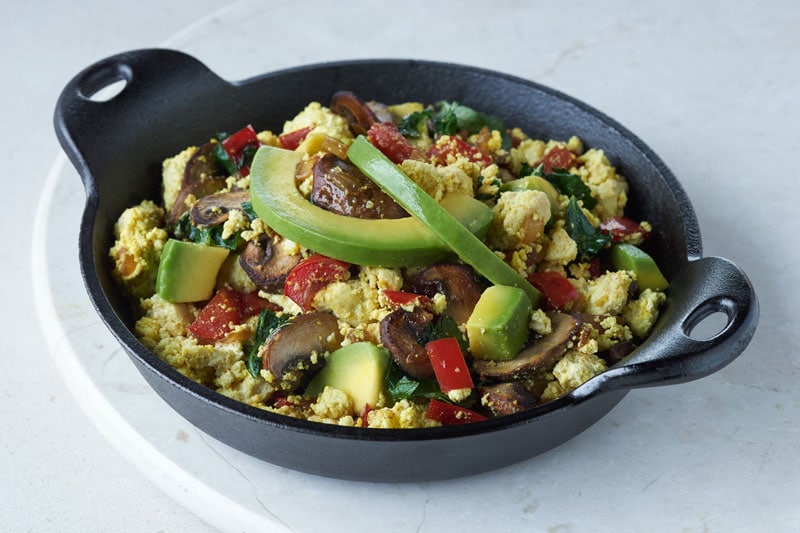
A vegan, hearty and nutritious fruit and veggie-packed breakfast with a cholesterol-free eggless scramble that satisfies egg-lovers, vegetarians and vegans. It provides an excellent source of protein (24% DV), vitamins C (60% DV) and K (35% DV) and a good source of fiber (18% DV) .
“”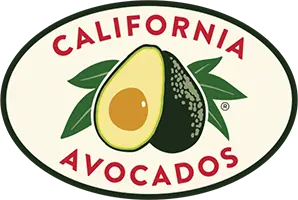

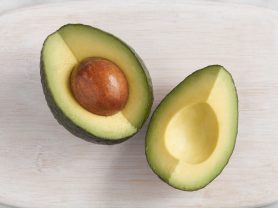
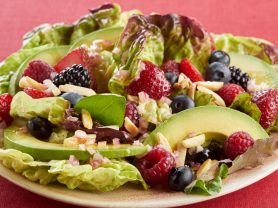
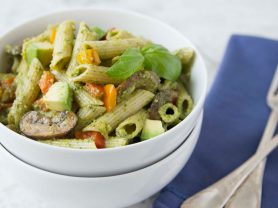
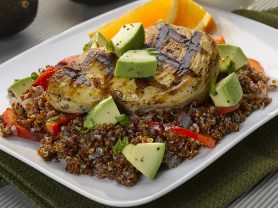
Comments